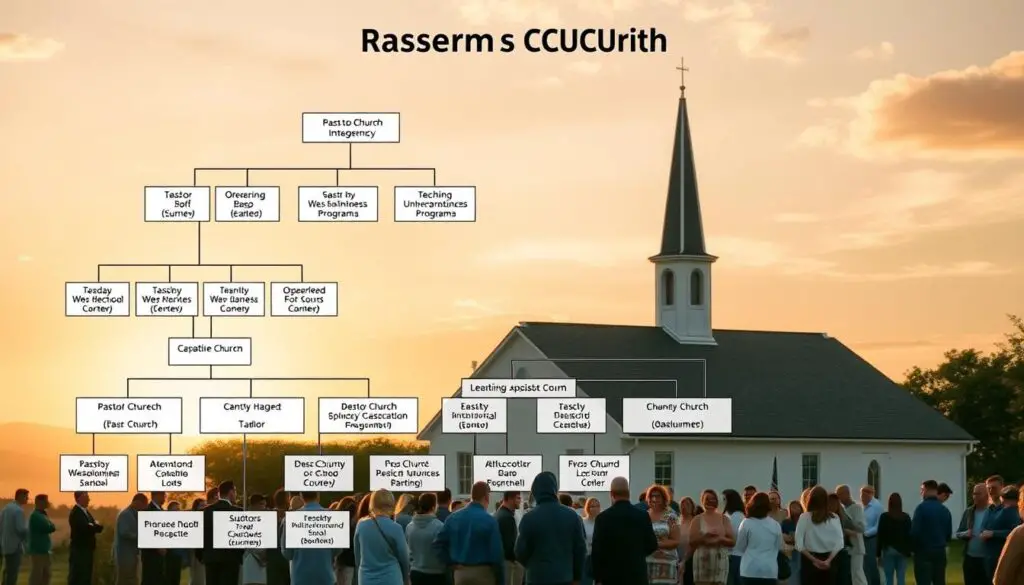Welcome to this exploration of Baptist theology! Whether you’re new to the topic or seeking clarity, this guide breaks down core principles in simple terms. Baptists share a rich heritage rooted in the 17th-century Reformation, emphasizing personal faith and scriptural authority. Over time, their teachings have evolved, but key ideas remain central to their identity.
At the heart of Baptist theology is the conviction that salvation comes through Jesus Christ alone. This belief shapes their practices, from baptism to community worship. Unlike some traditions, Baptists prioritize individual choice in matters of faith. Every member’s relationship with God is deeply personal.
This article will unpack their historical roots, doctrinal foundations, and how these ideas shape daily life. You’ll discover why scripture holds ultimate authority and how congregations maintain autonomy while sharing core values. Let’s dive into a tradition built on freedom, faith, and fellowship.
Key Takeaways
- Baptists emphasize personal faith and a direct relationship with Jesus Christ.
- Scripture serves as the ultimate authority in theological matters.
- Salvation is viewed as a gift received through faith, not works.
- Congregations operate independently while sharing core beliefs.
- Beliefs have evolved historically but maintain Reformation-era roots.
Historical Foundations of Baptist Beliefs
To understand Baptist traditions today, we need to explore their journey through time. Emerging during Europe’s religious upheavals, early groups blended Reformation principles with a radical commitment to individual conscience. These pioneers valued scripture over institutional authority, planting seeds for future growth.
Early Influences and Calvinist Roots
Many 17th-century Baptists drew from Calvinist teachings about God’s sovereignty. Yet over time, emphasis shifted toward free will and personal conversion. This evolution created space for diverse interpretations within the movement.
By the 18th century, the Great Awakening reshaped priorities. Revival meetings sparked emotional worship styles and grassroots evangelism. Preachers like George Whitefield inspired crowds to seek direct spiritual experiences.
The Impact of the Great Awakening and Modernism
New intellectual currents in the 19th century challenged traditional views. Figures like Shailer Mathews blended faith with modern science, while others defended conservative doctrines. These debates strengthened the movement’s adaptability.
Religious liberty became a cornerstone early on. Colonial-era Baptists often faced persecution but fought fiercely for self-governance. Their stance influenced America’s constitutional separation of church and state.
Through centuries of change, core ideals persisted. Today’s practices still reflect this legacy of scriptural focus and community-driven faith.
Core Doctrines and Convictions
At the heart of Baptist practice lie distinct principles that define their spiritual identity. These convictions shape worship, community life, and individual choices while allowing flexibility across local churches.
The Supreme Authority of the Bible
Baptists reject formal creeds, relying instead on scripture for guidance. This non-creedal approach means every teaching aligns with biblical texts rather than human-made doctrines. Members study passages directly to discern truth, fostering unity through shared interpretation.
This focus creates diverse expressions of faith. While churches might emphasize different verses, all agree scripture holds final authority. Such flexibility lets congregations adapt practices to modern contexts without compromising core truths.
Believer’s Baptism and Immersion
Water baptism symbolizes a spiritual rebirth. Unlike infant rites, this act follows a personal decision to follow Christ. Immersion mirrors Jesus’ own baptism, visually portraying death to old ways and resurrection to new life.
Three key ideas shape this practice:
- Only believers capable of conscious faith participate
- The local congregation witnesses and affirms each commitment
- Water becomes a public declaration of inward transformation
These doctrines unite Baptists globally. Whether in rural chapels or urban megachurches, shared convictions about scripture and baptism create bonds across cultures. Historical debates refined these ideas, ensuring relevance through changing eras.
How Do Baptist Believe: Key Practices and Theology
Central to Baptist spirituality is the dynamic interplay between personal conviction and communal life. This tradition balances individual spiritual freedom with collective accountability, creating a unique approach to Christian living.

The Role of Faith and the Holy Spirit
The Holy Spirit serves as both comforter and counselor in daily faith practices. Members trust this divine presence to illuminate scripture and shape ethical decisions. Unlike hierarchical structures, spiritual authority flows from biblical teachings rather than institutional mandates.
Three principles define this relationship:
- Every person accesses God directly through prayer and study (priesthood of believers)
- Congregants hold one another accountable through transparent relationships
- Worship services prioritize expository preaching to deepen scriptural understanding
Communal gatherings reinforce these ideals. Hymns, prayers, and shared testimonies create unity while respecting diverse perspectives. Local churches often organize small groups where members discuss applying biblical truths to modern challenges.
This framework encourages active participation rather than passive observance. Individuals take responsibility for spiritual growth while supporting peers through mentorship and service. Such practices foster resilience in both personal faith journeys and collective ministry efforts.
Worship, Communion, and Sacramental Practices
The act of communion stands as a cornerstone in Baptist worship services. Rooted in New Testament teachings, these rituals blend ancient symbolism with modern spiritual reflection. Every element carries layers of meaning, inviting participants to connect with foundational Christian narratives.
Understanding the Lord’s Supper
Central to Baptist practice is the Lord’s Supper, observed as a memorial rather than a mystical event. The bread and cup symbolize Christ’s sacrifice, echoing his final meal with disciples. “This is my body given for you,” Jesus instructed, framing the ritual as a call to remembrance.
Congregations typically share this sacrament monthly or quarterly. All baptized people are welcome, reinforcing unity across social divides. Unlike traditions teaching literal transformation, Baptists view the elements as powerful metaphors pointing to spiritual truths.
Emphasis on Expository Worship and Prayer
Sunday services prioritize scripture-driven worship. Pastors unpack biblical texts line by line, helping people apply ancient wisdom to daily life. Prayer interludes encourage personal reflection and communal intercession.
Three features define this approach:
- Sermons grounded in New Testament context
- Hymns that retell gospel stories
- Silent moments for individual meditation
This structure honors the separation church and state by focusing solely on spiritual edification. Through shared rituals and teachings, members renew their commitment to living out Christ’s message of love and sacrifice.
Church Organization and Membership
Baptist communities thrive on a distinctive blend of independence and shared purpose. Each congregation operates as a self-governing body, making decisions through collective prayer and democratic processes. This structure reflects centuries of commitment to spiritual freedom and practical collaboration.

Local Church Autonomy and Congregational Governance
Every Baptist church manages its own matters, from finances to ministry programs. Historical fights for religious liberty shaped this principle of self-rule. Congregations vote on key issues like leadership roles or community outreach, ensuring all members contribute to shaping their spiritual home.
Three features define this approach:
- Pastors lead but don’t dictate—final authority rests with the congregation
- Budgets reflect local priorities rather than denominational mandates
- Disagreements get resolved through open discussion and majority votes
Membership, Discipleship, and Mutual Accountability
Joining a Baptist church requires a personal declaration of faith. New members share their testimony publicly, symbolizing commitment to Christ and the community. This step isn’t just formality—it unlocks opportunities to serve and vote in church matters.
Accountability threads through daily life. Small groups help members grow spiritually while supporting peers. Many congregations use mentorship programs, pairing seasoned believers with newcomers. These relationships reinforce the principle that everyone plays a role in nurturing collective faith.
From selecting Sunday school teachers to launching food drives, Baptist congregations prove that shared responsibility strengthens community life. Their model honors individual voices while building unity through scripture-guided cooperation.
The Impact of Religious Liberty and Social Justice
Baptist communities have long stood at the crossroads of faith and civic engagement. Their commitment to individual conscience often spills into public life, shaping laws and cultural norms. This legacy stems from early leaders who saw spiritual freedom as inseparable from societal fairness.
Separation of Church and State in Practice
Roger Williams, a 17th-century Baptist pioneer, famously argued that government should never control religious practice. His advocacy led to Rhode Island becoming America’s first colony with legal separation church state. This principle later influenced the First Amendment, ensuring all faiths could thrive without interference.
Modern Baptist churches continue this tradition. Many oppose state-sponsored prayers in schools or tax-funded religious displays. As one pastor noted: “A free church in a free state—that’s the ideal.”
| Era | Focus Area | Impact |
|---|---|---|
| 1600s | Religious Persecution | Established first religious free colonies |
| 1800s | Abolition Movement | Supported Underground Railroad networks |
| 1960s | Civil Rights | Led voter registration drives |
Advocacy for Equality and Interdenominational Cooperation
From the Civil Rights era to modern refugee aid, local congregations partner across faith lines. The Baptist Joint Committee for Religious Liberty works with Catholic, Jewish, and Muslim groups to protect worship rights globally.
Key achievements include:
- Opposing literacy tests that blocked minority voters
- Launching food banks serving diverse neighborhoods
- Advocating for prison reform through interfaith coalitions
Today’s efforts focus on digital privacy rights and climate justice. By maintaining separation church state, these communities keep their moral voice independent yet influential in the world.
Conclusion
Baptist teachings continue to shape lives through timeless principles and adaptable practices. Rooted in Reformation-era ideals, this tradition balances scriptural authority with evolving cultural contexts. From early fights for religious liberty to modern social justice efforts, Baptists have championed both personal faith and communal responsibility.
Central doctrines like believer’s baptism and local congregation governance remain vital. These ideas foster active membership participation while respecting individual conscience. Historical milestones—the Great Awakening, civil rights advocacy—show how core beliefs adapt without losing their essence.
Today’s Baptist communities honor their heritage through worship practices and civic engagement. The separation church state principle, forged through centuries of struggle, still guides public witness. As cultural landscapes shift, these time-tested values offer stability amid change.
Reflect on how such enduring convictions influence modern spirituality. For those curious about religious freedom or community-driven faith, Baptist traditions provide rich soil for exploration. Their story reminds us that deep roots allow branches to grow in surprising directions.
FAQ
Why is local church autonomy central to Baptist identity?
Local congregations govern themselves without external hierarchy, reflecting a commitment to congregational governance. This allows each church to interpret Scripture and make decisions tailored to its community’s needs.
How does believer’s baptism differ from infant baptism?
Baptists practice immersion only after a person consciously professes faith in Christ. This contrasts with infant baptism, which they view as lacking personal commitment to the gospel.
What role does religious liberty play in Baptist theology?
Baptists historically advocate for the separation of church and state, opposing government interference in matters of faith. This principle protects individual conscience and fosters diverse spiritual expression.
Why is expository preaching emphasized in worship services?
Expository teaching prioritizes verse-by-verse biblical analysis, ensuring sermons align with Scripture’s authority. This method deepens understanding and connects teachings to daily life.
How do congregations practice mutual accountability?
Members commit to discipleship, ethical living, and supporting one another through challenges. Church discipline, when necessary, aims to restore individuals rather than punish.
What defines the Baptist view of the Lord’s Supper?
Communion is a symbolic act commemorating Christ’s death, open to all believers. Unlike some traditions, it’s not seen as sacramental but as an obedient remembrance of grace.
How did the Great Awakening shape Baptist growth?
Revivalism during the 18th century stressed personal conversion and evangelism, fueling Baptist expansion. Emotional preaching and lay participation became hallmarks of the movement.
Why do Baptists avoid formal creeds or confessions?
While respecting historic Christian doctrines, congregations prioritize Scripture over man-made statements. This avoids rigid dogma and allows flexibility in non-essential beliefs.
How do social justice efforts align with Baptist principles?
Many churches advocate for equality, poverty relief, and religious freedom, seeing these as extensions of Christ’s love. Collaboration across denominations often amplifies their impact.